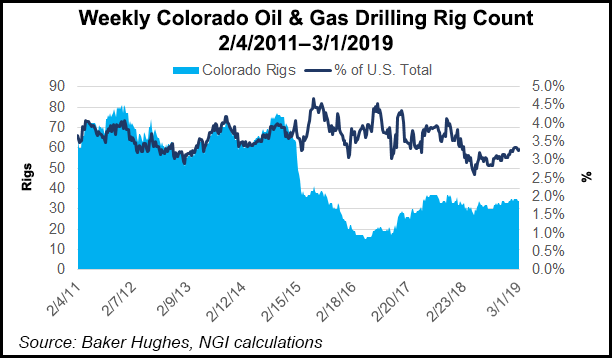Regulatory | NGI All News Access | NGI The Weekly Gas Market Report
Colorado’s Plan to Tighten Oil, Gas Regulations Draws Industry Ire
Colorado Gov. Jared Polis and legislative leaders want to reform oil and natural gas regulations, allowing more local government input on future energy development and, among other things, strengthen forced pooling requirements for producers.

Calling attention to Anadarko Petroleum Corp.’s abandoned gas well flowline explosion two years ago, Polis last week said the oil and gas siting process and rules haven’t kept up with the industry’s technological and operating advances and, thus, he is supporting legislation that is expected to be introduced soon.
State Senate Bill (SB) 181, officially unveiled last Friday, states that it provides “additional public welfare protections regarding the conduct of oil and gas operations.” It is intended to “enhance local governments’ ability to protect public health, safety, and welfare, and the environment by clarifying, reinforcing and establishing their regulatory authority over the surface impacts of oil and gas development.”
While current law gives local communities certain land-use powers related to oil and gas, the legislation would give them more power and reduce the authority of the Colorado Oil and Gas Conservation Commission (COGCC) to regulate activities.
“Collectively our team has spent hundreds of hours meeting with experts, and the proposal we have crafted is both sweeping and reasonable, effective and flexible,” Senate Majority Leader Stephen Fenberg said.
The Colorado Oil and Gas Association (COGA) and Colorado Petroleum Council (CPC) on Sunday urged state leaders to take time before pushing the bill in hearings and instead “allow a diverse set of stakeholders more time to review the comprehensive and technical piece of legislation.
“Our elected leaders can’t be asked to vote on a bill this complicated and this encompassing — and one with such grave impacts without first a legitimate dialogue,” said COGA CEO Dan Haley and CPC Executive Director Tracee Bentley.
Haley said a characterization by politicians that the state’s regulations have not been updated in 60 years is “revisionist history. We have the strictest regulations in the country, and they have been updated dozens and dozens of times with bipartisan support,” before former Gov. John Hickenlooper was governor.
“While we are offended by this intentional mischaracterization of our industry, we’re committed to the upcoming legislative process because we’re committed to Colorado,” Haley said. “There is a reason,” he said, that legislators “dumped this bill late on a Friday with no stakeholder process, no conversation, no dialogue. The industry is ready to have a conversation and strengthen our rules, but this bill is extreme.”
Bentley urged that “all voices” be brought to the negotiating table, and particularly energy industry representatives, noting the industry supports 232,900 jobs and created an estimated $31.4 billion in annual economic activity in the state.
Analysts with Tudor, Pickering, Holt & Co. (TPH) weighed in Monday on the proposed rules.
“Bottom line, the first look removes some uncertainty, but the amended form is still to be determined with much of the current language open to interpretation, leaving unknowns that keep the group in wait-and-see status for us,” analysts said.
The bill proposes local governments be given land use authority, which TPH analysts interpret as enabling them to regulate siting oil and gas locations for facilities and drilling units, as well as land use for surface impacts.
The proposed legislation also would include the power for local authorities to inspect oil and gas facilities, impose fines for leaks/spills and impose fees for the costs of the associated permitting, regulation, monitoring and inspection, TPH noted.
For the COGCC, “much of the language is bureaucratic,” as the bill proposes that the commission include “fewer industry experts,” who would be replaced with members “who are individually experienced in environmental protection, wildlife protection, soil, agriculture and public health,” analysts said.
The state’s Oil and Gas Conservation Act in 1951 gave the COGCC the dual authority to regulate and develop the industry. The new legislation proposes to “clarify that nothing in the Act would negate/alter/impair” the power of the state’s Air Quality Control Commission, the Water Quality Control Commission, the State Board of Health, the Solid and Hazardous Waste Commission on their respective functions, nor for local governments with respect to land regulation,” according to TPH.
On forced pooling, the legislation also proposes a requirement for producers to receive consent representing more than 50% of mineral interests, which compares to the current requirement calling for consent from only one lease or royalty interest owner, TPH said.
Producers are paying attention.
During a recent quarterly earnings conference call, Denver-based Extraction Oil & Gas Corp. CEO Mark Erickson said the company, whose focus is Colorado, is in discussions with multiple stakeholders about the legislative proposal.
“We try to stay as abreast of it as we can, but realistically we don’t have anymore information than anybody else,” Erickson said. “We’re hoping the outcome is balanced and brings both sides of the issue together, and allows the industry a clear path to development moving forward.”
© 2024 Natural Gas Intelligence. All rights reserved.
ISSN © 1532-1231 | ISSN © 2577-9877 | ISSN © 1532-1266 |
